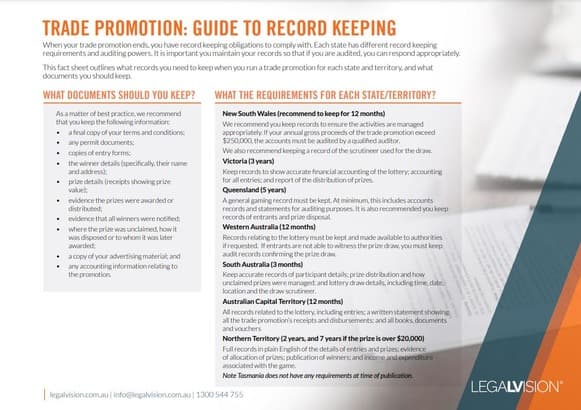As part of operating your business, you will likely explore novel ways to market your products and trade. Trade promotions are a common and popular method to promote your business and services. They are a form of permitted gambling and each state heavily regulates them accordingly. This article will highlight your record-keeping obligations while running a trade promotion.
What is a Trade Promotion?
A trade promotion is a free-entry competition a business conducts to promote their goods or services. The three elements of a trade promotion are that they must be:
- free to enter;
- promoting goods or services; and
- conducted by a registered business.
The two main types of trade promotions are:
- games of skill; and
- games of chance.
Trade promotions are commonly games of skill – specifically lotteries or random number generators, where entrants can purchase a product or service and enter the draw to receive a prize. You may need a permit or authority to operate this type of promotion, depending on:
- which state or territory you operate your business; and
- the dollar value of the total prize pool.
The majority of states and territories do not require a permit. In those that do, the requirements can vary. If you are running a trade promotion across Australia, you should comply with each state or territory’s requirements for permits and authorities.

This fact sheet outlines what records you need to keep when you run a trade promotion for each state and territory, and what documents you should keep.
Record-Keeping Obligations
Each state and territory has different requirements concerning record-keeping. The regulatory bodies can request these documents and require additional special audits in some cases. A high-level overview of these requirements is below:
| State | Records | Time |
| NSW | There is no requirement to keep records. However, maintaining records is recommended to ensure the activities are managed appropriately. If your annual gross proceeds of the trade promotion exceed $250,000, a qualified auditor must audit the accounts. We also recommend keeping a record of the scrutineer used for the draw. | Not mandatory. Recommend 12 months. |
| VIC | Records must be kept to show accurate financial accounting of the lottery and entries and an accurate report of the distribution of prizes. | 3 years. |
| SA | You must keep an accurate record of participant details, the distribution of all prizes, and details of how you dealt with unclaimed prizes. Additionally, you must record the details of a lottery draw, including time, date, location and scrutineer of the draw. | At least 3 months after drawing the lottery. |
| ACT | All records concerning the lottery, including: a record of entries;written statement showing the whole of receipts and disbursements in connection with the trade promotion andall books, documents and vouchers relating to the lottery. | Minimum 12 months following determination of the results. |
| WA | Records relating to the lottery must be kept and made available to authorities if requested. If entrants are not able to witness the prize draw, audit records confirming the prize draw must be kept. | 1 year |
| QLD | A general gaming record must be kept. At minimum, this will include accounts records and statements for auditing purposes. As a matter of best practice, keeping records of entrants and prize disposal is also recommended. | 5 years |
| NT | Full records must be kept showing the following details in plain english:entries received;allocation of prizes; and income and expenditure associated with the game. | Minimum 2 years or up to 7 years if the prize is valued over $20,000 |
| TAS | No requirements | N/A |
Record-Keeping Tips
As a matter of best practice, you should keep the following records:
- a final copy of your terms and conditions;
- any permit documents;
- copies of entry forms;
- the winner details (name and address);
- prize details (specifically receipts showing prize value);
- evidence the prizes were awarded and distributed;
- evidence that winners were notified;
- where the prize was unclaimed, how it was disposed;
- a copy of your advertising material; and
- accounting information relating to the promotion.
Privacy Considerations
In addition to your record-keeping obligations, you will have additional privacy obligations. In the course of operating a trade promotion, you may receive personal information about your entrants and customers.
You can limit this to:
- a name;
- age;
- address; and
- contact email and phone number.
Key Takeaways
Running a trade promotion can be an impressive way to generate interest in your brand, engage new customers, or drive sales. You should be aware of your record-keeping and auditing requirements.
If you need help with non-disclosure agreements, our experienced regulatory and compliance lawyers can assist as part of our LegalVision membership. For a low monthly fee, you will have unlimited access to lawyers to answer your questions and draft and review your documents. Call us today on 1300 544 755 or visit our membership page.
Frequently Asked Questions
A trade promotion is a free-entry competition conducted to promote goods or services supplied by a business.
The two main types of trade promotions are games of skill and games of chance.
We appreciate your feedback – your submission has been successfully received.












